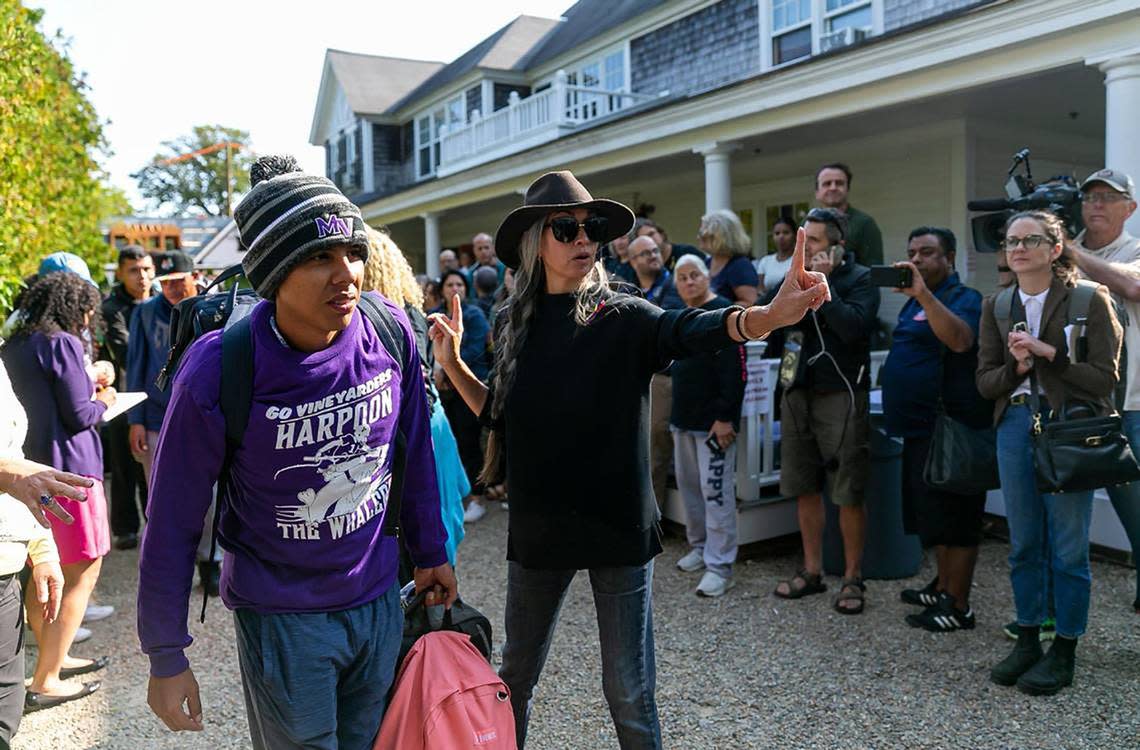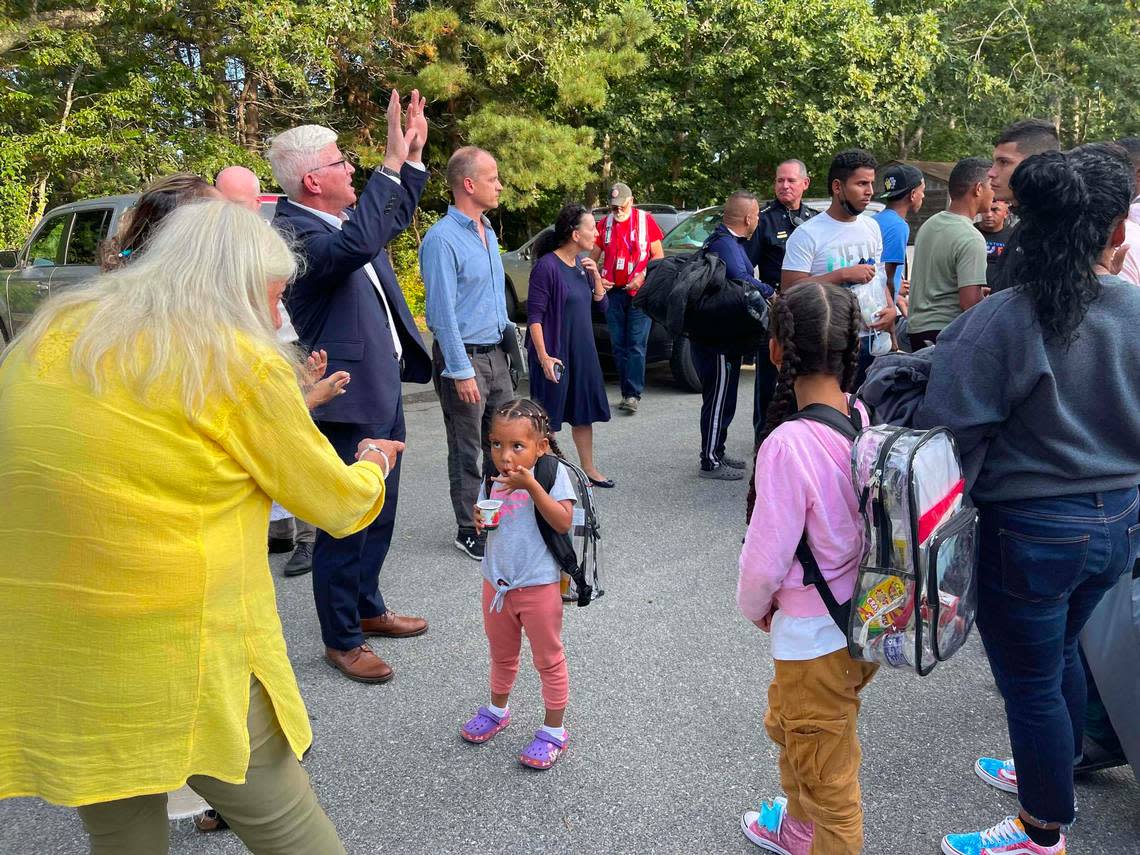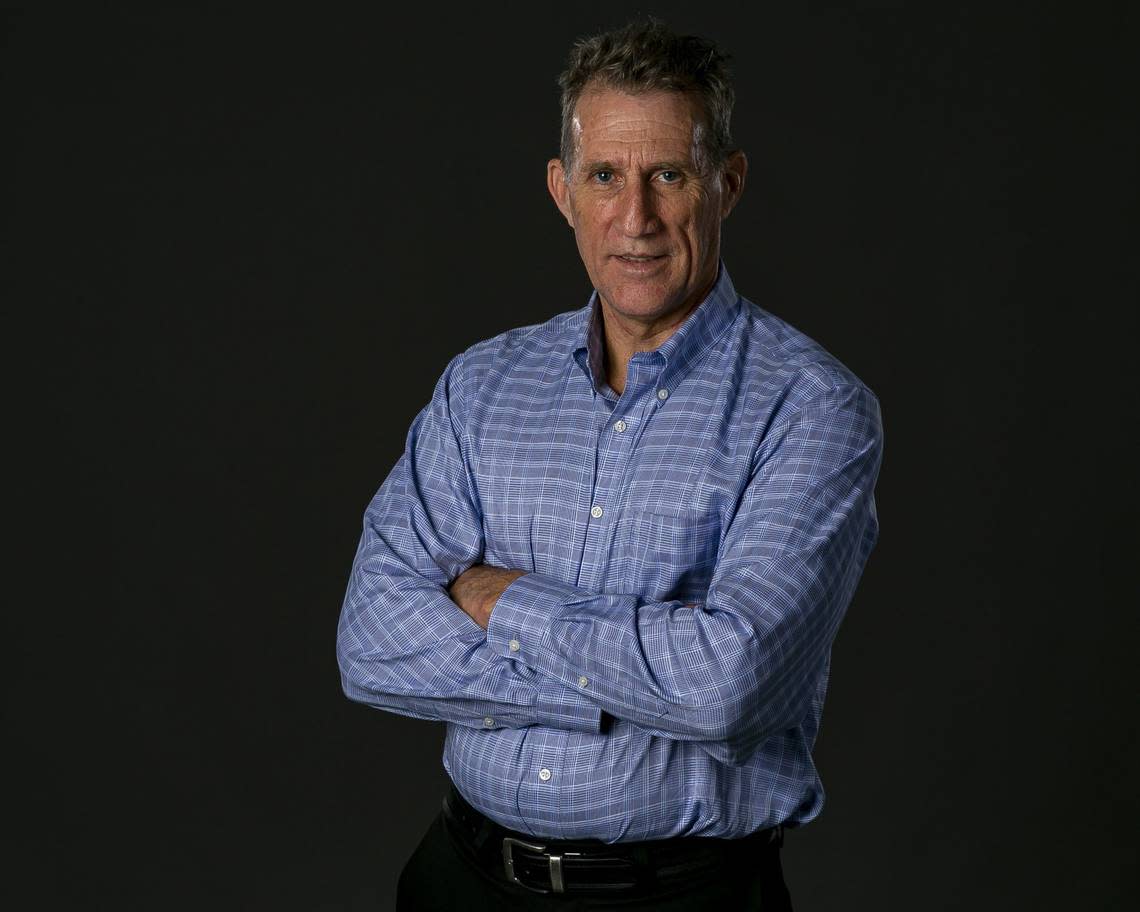Miami Herald wins Polk Award for investigation into Gov. Ron DeSantis’ migrant flights
The Miami Herald’s coverage of Gov. Ron DeSantis’ involvement in arranging to send two planes with 49 South American migrants to Martha’s Vineyard from Texas in September won the George Polk Award in the political reporting category.
Long Island University on Monday also announced the winners of the George Polk Awards in 14 other categories for reporting in 2022. The journalism awards honor investigative and enterprise reporting across newspapers, magazines, television, radio and online news organizations. Previous winners included Walter Cronkite, James Baldwin and Bob Woodward and Carl Bernstein, The Washington Post duo who first exposed the Watergate scandal during the Richard Nixon administration in 1972. Three Polk Award recipients for 2022 won for coverage of the war in Ukraine.

Miami Herald team
The university cited the Herald’s coverage of the Florida governor’s role in the immigration scheme in reporting by Sarah Blaskey, Nicholas Nehamas, Ana Ceballos, Mary Ellen Klas and staff “for exposing the cruel calculus behind two flights taking 49 misled South American refugees from Texas to Martha’s Vineyard at the behest of Florida Gov. Ron DeSantis.”
The Herald stories, edited by Casey Frank, senior editor for investigations, and Dave Wilson, senior local and state government editor, and visually reported in Massachusetts by Matias J. Ocner and in Texas by Carl Juste, “traced the operation to recruiters who lured them and other migrants with false promises of work in a political stunt the Herald calculated cost Florida taxpayers $1.565 million,” the Polk selection committee said.
READ MORE: DeSantis’ office takes credit for sending migrants to Martha’s Vineyard
John Darnton, curator for the Polk Awards, praised the Herald’s team for its investigation.
“The Herald excelled in marshaling a team to cover all aspects of the story, sending reporters to Texas and Martha’s Vineyard for first-hand accounts from the bewildered migrants. The team uncovered an agent who was central to the scheme,” he said.
Reporting challenges

Herald editors spoke of the challenges in reporting the story and of the award’s significance.
“The biggest challenge in reporting on these stories was the inability to get any answers to our questions from government officials or legislators with access to the information about this Florida program to relocate people from another state. Even basic questions went unanswered. Documents that should be public record were not produced. It was a fight for information all the way,” Wilson said.
“It’s always gratifying to see an organization like Polk recognize the hard work Herald reporters do to hold government officials accountable. We’re very appreciative of the recognition,” Wilson said.
“To receive this prestigious award is a great honor because it recognizes the power of local journalism. Our staff is second to none, and this award could not have happened if it was not for the dedication and resilience of our journalists,” said Alex Mena, the Miami Herald and el Nuevo Herald’s interim executive editor.
“Our reporters dug deep to show how these flights were secretly pulled together and how it affected vulnerable people. The search for the truth took our reporters from Miami to Martha’s Vineyard, San Antonio, North Carolina, Tampa and the Florida Panhandle. We stood up for an underrepresented minority, those seeking a new life in America, that is such a large part of our community,” Mena said.
About the Polk Awards
The George Polk Awards were established in 1949 by Long Island University in New York to commemorate George Polk, a CBS correspondent murdered while covering the Greek civil war in 1948. Polk was 34.
The 2022 winners were selected from 515 submissions of work that appeared in print, online or on television or radio. The stories were nominated by news organizations and individuals or recommended by a national panel of advisors, according to Long Island University.
“We were deluged with so many worthwhile entries it was difficult to choose among them,” Darnton said in a news release. “Interestingly, a lot of reporters went after large, thematic stories, like the role of private equity companies in buying up hospitals, private homes and apartment complexes. And the war in Ukraine produced superb war reporting, done at great peril.”
Sydney H. Schanberg Prize
Freelance journalist Alex Perry won the Polk Awards’ Sydney H. Schanberg Prize for his 20,000-word investigative account in Outside Magazine of a 2021 ISIS attack on the remote town of Palma in northern Mozambique that left an estimated 837 dead. The piece focused on foreign workers, contracted by an oil company, taking refuge in a hotel as terrorists surrounded them.
The Schanberg Prize was established in 2022 by journalist Jane Freiman Schanberg to honor long-form investigative or enterprise journalism embodying qualities reflected in her late husband’s career.
“The fearless work of these distinguished journalists proves that diligent reporting will always have the power to affect positive change throughout the world,” said Long Island University President Kimberly R. Cline in a statement. “Long Island University is pleased to recognize this year’s George Polk Award winners for exceptional work that will be remembered over the course of history.”
The 2022 George Polk Award winners will be honored April 14 at a luncheon ceremony at the New York Athletic Club, following an evening seminar April 13 on Long Island University’s Brooklyn campus.
List of 2022 Polk winners

In addition to the Herald team and the Schanberg Prize winner, Polk Award winners included:
▪ The New York Times staff, foreign reporting, for coverage of the war in Ukraine. “The Making of Vladimir Putin,” a 6,750-word opus by Paris bureau chief Roger Cohen, traced Putin’s “22-year slide from statesman to tyrant,” and “Putin’s War,” the 13,000-word product of two months of research replete with invasion maps, cell phone intercepts and diaries from Russian soldiers, exposed the vaunted Russian military as unprepared, ill equipped and badly managed.
▪ Videojournalist Mstyslav Chernov, photographer Evgeniy Maloletka, video producer Vasilisa Stepanenko and reporter Lori Hinnant of The Associated Press, war reporting, for narratives and images during the siege of Mariupol.
▪ Josh Gerstein, Alex Ward, Peter Canellos and the staff of Politico, national reporting, for revealing Supreme Court Justice Samuel Alito’s draft opinion overturning Roe v. Wade.
▪ John Archibald, Ashley Remkus and Ramsey Archibald of the website AL.com, local reporting, for revealing how the police force in Brookside, Alabama, used proceeds from fines for nefarious citations and arrests and forfeitures to bilk residents of thousands of dollars.
▪ Joshua Schneyer, Mica Rosenberg and Kristina Cooke of Reuters, state reporting, for revealing how staffing agencies in Alabama cashed in on lucrative commissions in a tight labor market by using fake documentation to put migrant children as young as 12 to work in Hyundai auto parts factories and poultry slaughterhouses in their series, “Undocumented and Underage.”
▪ Kendall Taggart, John Templon, Anthony Cormier and Jason Leopold of BuzzFeed News, health reporting, for demonstrating how the quality of care diminished after the global private equity firm KKR purchased hundreds of homes for people with severe disabilities in their series, “Profit, Pain, and Private Equity.”
▪ Ian Allison and Tracy Wang of the digital currency news source CoinDesk, financial reporting, for stories that brought Sam Bankman-Fried and his supposed $32 billion crypto currency empire crashing down in just 10 days.
▪ Terrence McCoy of The Washington Post, environmental reporting, for his six-part series, “The Amazon, Undone,” which examined the illegal and often violent exploitation of a vital global resource nearing the tipping point of irreparable destruction.
▪ Eliza Shapiro and Brian M. Rosenthal of The New York Times, education reporting, for detailing the failure of New York’s Hasidic yeshivas to provide 50,000 boys with a basic education despite receiving more than a quarter of a billion dollars in public funds annually.
▪ ProPublica reporter Brett Murphy, justice reporting, for “Words of Conviction,” a two-part report debunking “911 call analysis,” a prosecutorial technique developed by a retired police chief purporting to indicate the guilt of callers reporting the death of someone based on their voice patterns during the call.
▪ Correspondent Sharif Abdel Kouddous, Senior Producer Kavitha Chekuru and Executive Producer Laila Al-Arian, foreign television, for “The Killing of Shireen Abu Akleh,” a segment on Al Jazeera English Fault Lines.
▪ Shimon Prokupecz and his CNN crew, national television reporting, for coverage of the failed law enforcement response to a mass school shooting in Uvalde, Texas.
▪ Lynsey Addario of The New York Times, photojournalism award, for an iconic photo of the bodies of a woman and her two children alongside a friend who lay dying moments after a mortar struck them as they sought to flee Ukraine.
▪ Theo Baker of The Stanford Daily, special award, for uncovering allegations that pioneering research co-authored by Stanford President Marc Tessier-Lavigne was supported in part by manipulated imagery and that Tessier-Lavigne and his associates failed to avail themselves of opportunities to correct the record.


